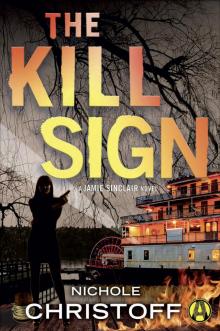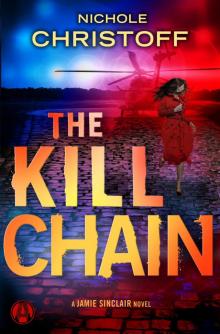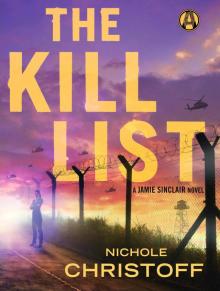- Home
- Nichole Christoff
The Kill Radius
The Kill Radius Read online
The Kill Sign is a work of fiction. Names, places, and incidents either are products of the author’s imagination or are used fictitiously. Any resemblance to actual events, locales, or persons, living or dead, is entirely coincidental.
An Alibi Ebook Original
Copyright © 2016 by Nichole Christoff
All rights reserved.
Published in the United States by Alibi, an imprint of Random House, a division of Penguin Random House LLC, New York.
ALIBI is a registered trademark and the ALIBI colophon is a trademark of Penguin Random House LLC.
Ebook ISBN 9780425285329
Cover design: Tatiana Sayig
Cover images: Shutterstock
randomhousebooks.com
v4.1
ep
Contents
Cover
Title Page
Copyright
Chapter 1
Chapter 2
Chapter 3
Chapter 4
Chapter 5
Chapter 6
Chapter 7
Chapter 8
Chapter 9
Chapter 10
Chapter 11
Chapter 12
Chapter 13
Chapter 14
Chapter 15
Chapter 16
Chapter 17
Chapter 18
Chapter 19
Chapter 20
Chapter 21
Chapter 22
Chapter 23
Chapter 24
Chapter 25
Chapter 26
Chapter 27
Chapter 28
Chapter 29
Chapter 30
Chapter 31
Chapter 32
Chapter 33
Chapter 34
Chapter 35
Chapter 36
Chapter 37
Chapter 38
Dedication
Acknowledgments
By Nichole Christoff
About the Author
Chapter 1
“Welcome to Mississippi!” the smiling flight attendant hollered as a hard rain, rattling on the fuselage of the Boeing 717, did its best to drown out her greeting.
For the fifty-second time since dawn, I shoved my square-rimmed glasses higher on the bridge of my nose, checked the hour on the Cartier Roadster strapped to my wrist, and grimaced. Thanks to a surprise squall that had blown up over the southern U.S., my quick trip from Washington, DC, to the Magnolia State had turned into more of a mid-morning marathon. And while the pilot had done his best to avoid the worst of the rough weather, the ride had been a bumpy one. As a result, I was rather green around the gills. Worse yet, I was running late.
Still, I flashed the stewardess a thumbs-up as I edged past her and the cabin crew with my rolling carry-on in tow. The gangway accordioned to the side of the craft couldn’t seal out the cold, clammy scent of February so close to the Gulf Coast’s sandy shore—or the sound of the downpour beating the Beauville Regional Airport. But the briny air was a vast improvement over the recirculated stuff that had flowed through the Boeing’s tubes and vents, so I sucked in a cleansing breath, willed my stomach to settle, and hustled toward the airport proper.
Truth be told, I wasn’t worried about catching a connecting flight, or making a meeting with one of my high-risk, high-profile clients. No, as the boss of my own private security firm, I’d rearranged my schedule so I could be off the clock all weekend long because I’d been invited down south for a social visit. And I intended to be sociable indeed.
At the gate, I breezed past the steel door linking the jetway to the terminal and emerged in a carpeted waiting area filled with row after row of shabby vinyl seats, abandoned newspapers, and lost coffee cups. Across the way, electronic numbers flashed on wall-mounted monitors, telling travelers where to find arrivals, departures, and baggage claim. Exhausted parents tramped after energetic children. Porters pushed carts piled high with luggage. Businessmen and women, oblivious to everything but their cellphones, rushed past, their dress shoes snapping and clicking on the concourse’s polished floor.
In the midst of all the commotion, one man stood completely still. He wore the grays-and-greens of a U.S. Army Combat Uniform. The sleeves were rolled and cuffed at his impressive biceps the way ACU sleeves were meant to be worn in a warm climate—and he sure looked good that way.
Although he was indoors, he hadn’t doffed the black beret capping his sandy hair. This meant he was armed. Some of the travelers hurrying past him glanced warily at the black M9 handgun hitched to his hip.
I wasn’t worried about it. After all, this soldier was a military cop, and as a courtesy, transportation authorities often allowed uniformed military police to carry their weapons when business of one kind or another brought them to the airport. Besides, before he’d been banished to Mississippi’s Fort Donovan for temporary duty, this particular MP had served his country every day as a military police commander. His name was Lieutenant Colonel Adam Barrett. And he was the reason I’d flown through a winter storm that morning.
Barrett’s smile was as swift and as bright as a lightning strike, but it had been four long months since I’d seen it in person. Now it flashed as his bittersweet brown eyes met mine. And like always, that grin nearly did me in.
I wasn’t sure which one of us reached for the other first, and, frankly, I didn’t care. Despite military regulations prohibiting public displays of affection, I was in Barrett’s arms in a heartbeat. He smelled of citrus and saddle leather, and I took the time to breathe him in.
“I’ve missed you,” he murmured against the shell of my ear.
I could’ve said as much to him and more, but I didn’t. Because Barrett had someplace he needed to be. Reluctantly, I slipped from his embrace.
“You won’t get in more trouble because my flight was late, will you?”
Barrett grinned again, smoothed a dark lock that had come loose from my ponytail, and tucked it behind my ear. “You’ve always been worth a certain amount of trouble, Jamie Sinclair.”
“Is that so?”
I couldn’t resist touching a fingertip to the stylized maple leaf that denoted his rank. Barrett’s build could put a prizefighter’s to shame, and the embroidered emblem just happened to be Velcroed to the middle of his muscled chest. Which meant I got to touch that, too.
“Yes, ma’am,” Barrett replied with a wink. “That’s definitely so.”
Well, I wasn’t sure about that estimation, but I knew one thing: Together, Barrett and I certainly had had our share of trouble. Last October, in fact, the consequences of an unsolved crime committed in his hometown had caught up with us. The cold case, and a rash of new ones, had nearly snuffed out our relationship—not to mention our lives.
I’d ended up with cracked ribs and the undeniable realization that I wasn’t just attracted to Barrett; I was in love with the guy. Barrett, it turned out, loved me in return. But the army intervened before we could do anything about it. Because, for all the right reasons, Barrett had made plenty of wrong choices—including going AWOL.
Naturally, the military takes a dim view of soldiers who are absent without leave. Penalties can range from a simple reprimand to loss of rank or income, or even jail time. Fortunately, a pal of mine in the Drug Enforcement Agency made sure Barrett’s superior couldn’t quite throw the book at him.
However, there had still been a price to pay.
For the foreseeable future, Barrett would continue to pay that price by holding down a desk at Fort Donovan, a rambling army post where young soldiers, fresh from the rigors of boot camp, worked hard in technical schools, played harder in civilian bars and clubs catering to the military crowd, and, after hours, got rowdy more often th
an not. And while desk jobs weren’t bad in and of themselves, for soldiers in certain operational fields they were a career killer. As an MP, Barrett’s career soon would be dead in the water unless he got out from behind that desk.
In the meantime, he was expected to double down on duty and perform every crummy task thrown his way. Consequently, he’d been working endless hours inventorying office supplies, compiling meaningless statistics, and producing mind-numbing reports to impossibly short deadlines. For example, did MPs on patrol burn through more ballpoint pens at the start of the month or at the end? To my mind, those figures couldn’t possibly matter to anyone anywhere in the Department of Defense. But Barrett had had to burn the midnight oil to crunch those numbers by dawn.
So, while no one called Barrett’s temporary assignment punishment, as the daughter of a former two-star general I knew that’s exactly what it was. He’d be ground down, chewed up, and spit out by the army’s own special brand of bureaucracy. And the worst of it was, he’d brought the situation on himself.
As if to drive that point home, Barrett had been granted no breathers, no breaks, and no time off. He hadn’t even had a single weekend to himself. Until now.
Tonight, his unit would hold its annual Dining Out. Afterward, nonessential personnel would have the luxury of a whole Saturday and an entire Sunday to spend any way they pleased. Since Barrett was certainly considered nonessential these days, this would give us the chance to finally spend some quality time together.
To that end, Barrett had pulled out all the stops, booking a room for me at a fancy hotel in the nearby town of Beauville. Far from Barrett’s billet in Fort Donovan’s Visiting Officers Quarters, where every soldier knew if anyone else so much as sneezed, we could open some champagne and hang out the DO NOT DISTURB sign. And then? Well, throughout our budding relationship, Barrett and I hadn’t had much of an opportunity to find out what could happen. This weekend, however, I had a feeling that would change.
But Barrett’s newfound freedom would evaporate if we didn’t get him back to the post before the lunch hour was over. He had another pointless report to finish before the end of the duty day. And given Barrett’s circumstances, his commander wasn’t likely to cut him any slack if he turned it in late.
Past the airport’s sliding doors, the storm had slowed to a miserable drizzle. On the walk to the short-term parking area, the air was chilly and the scent of brine was strong. I turned up the collar of my tweed blazer, but it didn’t do any good to keep me warm. Not that that mattered. All I could think about was getting Barrett back to his desk on time.
“At least you’ve still got eleven minutes on your meter,” I told him as he stashed my bag behind the bench seat of his red Ram truck.
“Really?” He closed me into the cab, jogged to the driver’s side, and climbed behind the wheel. “Then how about you slide over here so I can give you a real hello?”
I couldn’t resist that invitation. But sooner rather than later, I remembered the drive to the post would take the better part of twenty minutes. And we didn’t have many minutes to spare.
Against Barrett’s lips I whispered, “Time to get it in gear, soldier.”
With a groan, he let me go, started the truck’s engine, and got us on our way.
The roads ringing the regional airport rapidly gave way to strip malls and fast-food joints before cutting through bayou country and running toward Fort Donovan. The heart of Beauville and the army post alike were wedged on a spit of land between the expansive Gulf of Mexico and the body of water known as the Back Bay. All the surrounding real estate had been claimed generations ago by gracious antebellum homes with their gorgeous grounds, the little pink houses of the post–World War II era, and sprawling subdivisions that had sprung up like mushrooms before the American economy tilted toward an early twenty-first-century recession.
“Landscape look familiar?” Barrett asked.
“Yes,” I replied, surprised that so little had changed.
I’d first come to Fort Donovan and its environs over fifteen years before. I’d been a bride at the time, and my husband had been a newly commissioned second lieutenant. After spending my formative years in New Jersey, the move to Mississippi was life-changing, opening my eyes to the person I could be, rather than the person others had always told me I was.
“Wait till you see the Parkway,” Barrett said.
And with another turn, we were there.
Along the shore, where the sky, heavy with black clouds, met the silvery waves of the Gulf, ran the four-lane thoroughfare known as Jefferson Davis Parkway. It was named for that famous—or infamous—West Point Military Academy grad, U.S. Congressman, U.S. Secretary of War, and one-and-only President of the Confederate States of America, Jefferson Davis himself. Locals, however, simply called this high road the Parkway and apparently little had changed along it.
Well before the War of Northern Aggression, wealthy cotton barons had built summer homes along the Parkway’s original trace. Many still stood with their timeless verandas and tall windows full of tracery. High-rise hotels, however, had laid claim to the sandy beaches back when G.I. Joe came home from Europe, Africa, and the Pacific. As a result, artfully arranged palm trees and plain parking lots framed the ocean views. Only the architecture had altered as developers built bigger and better digs overtop the same old hotspots.
Judging by the dancing messages on the hotels’ spiffy electronic signs, however, they all boasted a new attraction since the last time I’d driven this route. Oh, they still offered all-you-can-eat seafood buffets, winter warm-up packages, and Jacuzzi rooms. However, now they promised casino gambling as well.
Across the U.S., plenty of states had legalized gambling in recent years. Advocates often argued that casinos, with their restaurants and rooms for overnight guests, created local service jobs and expanded the tax base. Dissenters, on the other hand, claimed that casinos oppressed local economies by paying employees peanuts while grinding the town down under the drug trafficking, prostitution, and gambling addiction these places spawned. Personally, I could see both sides of the issue, but what the heck did I know? I was only a private-eye-turned-security-specialist, and the topic had never turned up on my ballot, so I planned to stay out of it.
As we passed casino after casino, however, it got me thinking—and wondering—about the local populace. “How does that old saying go? ‘Lucky at cards, unlucky at love’?”
“Fortunately, I’ve never been much of a gambler.” Barrett slipped me a sideways glance.
I smiled. “Me, neither.”
We drove on, passing the weathered boardwalk where ancient piers still jutted into the Gulf. Shrimpers and other fishing vessels were moored along the docks, just as they had been fifteen years ago—and probably fifteen years before that. But gambling had made its mark in this part of Beauville, too. A maroon awning arching over one particular pier announced BEAUVILLE BELLE RIVERBOAT TOURS—and that its beautiful stern-wheeler was a floating casino.
“That,” Barrett said, chucking his chin toward the jetty, “is where we’re going tonight. We’ll be aboard the Lady Luck for Dining Out.”
Events like Dining Out, Dining In, and Commander’s Call were military traditions with roots extending back in time for centuries. More recently, every branch of the U.S. Armed Forces had put their individual spin on these customs. One thing, however, remained the same. Whenever one of these events popped up on the calendar, personnel of all ranks were expected to attend. As a result, men and women in uniform often referred to these get-togethers as “mandatory fun.” And sometimes, that assessment wasn’t far from the truth.
For a soldier who felt most comfortable with combat boots and beef jerky, Dining Out could be a trial. It meant facing all the pomp and circumstance of a formal dinner party at a fancy restaurant off the post. As a teen, I’d accompanied my father to one Dining Out after another, and I’d sat across the table from plenty of men who’d rather eat bugs during survival training than tr
y to identify a salad fork while the various commanders—and the commanders’ wives—looked on.
Barrett had an open outlook and an old-fashioned upbringing, so salad forks didn’t scare him. Still, he didn’t want to spend any part of his hard-earned weekend with a crowd, and, frankly, neither did I. Life in the military, though, was about meeting your obligations, whether you wanted to or not. I understood that. And I admired Barrett for his commitment to doing it.
With one more turn, we swung onto the wide avenue that ran up to Fort Donovan’s main gate. Static displays dotted the easement on either side of the street, showcasing a retired M1 Abrams tank, a decommissioned Bradley Fighting Vehicle, and other heavy equipment. As if all that iron and steel were ordinary statuary, beds of frost-resistant flowers had been planted in rings around each one. The landscaping was lovely, if a little odd. But that’s what you get on an army post.
Ahead, the gate itself was a skeletal span of metal, arching over three lanes of crawling traffic and protecting a trio of MPs from the rain as they performed what’s known as a 100 percent ID check. Barrett reached for the glove box and extracted some paperwork he’d completed in honor of my visit. Knowing the drill, I slid my Virginia driver’s license from my wallet and handed it to him.
The cars ahead of us crept forward. I glanced at my watch. We had nine minutes to get Barrett back to work.
Three minutes later, we finally reached the head of the line. Barrett powered down his window as we slowed to a stop under the arch. A military cop with a wiry build, lush black lashes curling against his brown cheeks, and an M4 automatic rifle slung across his body stepped up to the truck.

 The Kill Wire
The Kill Wire The Kill Box
The Kill Box The Kill Radius
The Kill Radius The Kill Shot
The Kill Shot The Kill Chain
The Kill Chain The Kill List
The Kill List